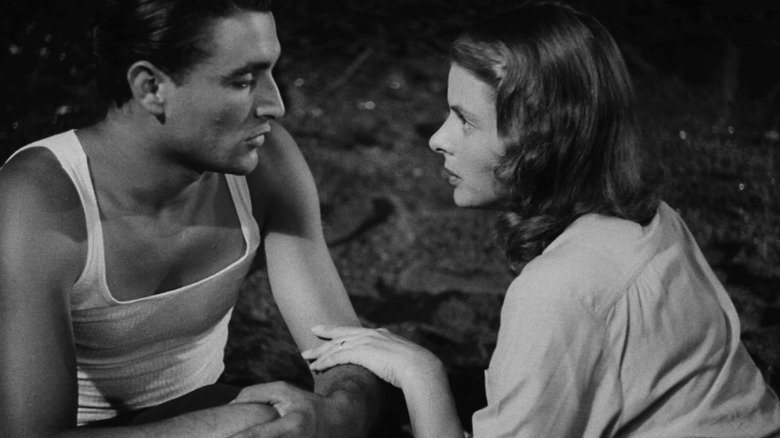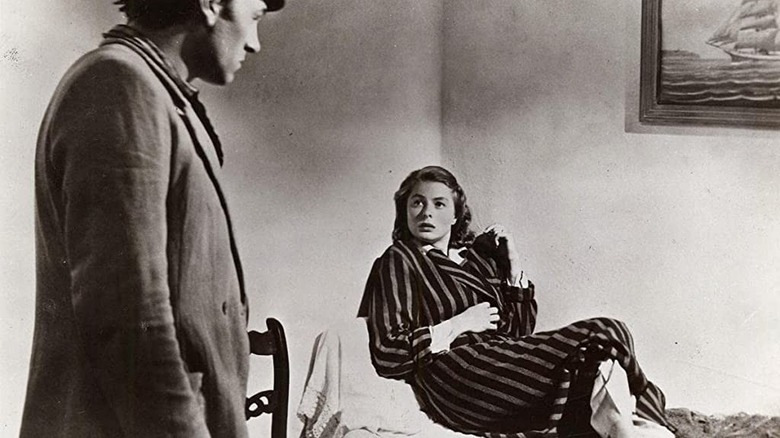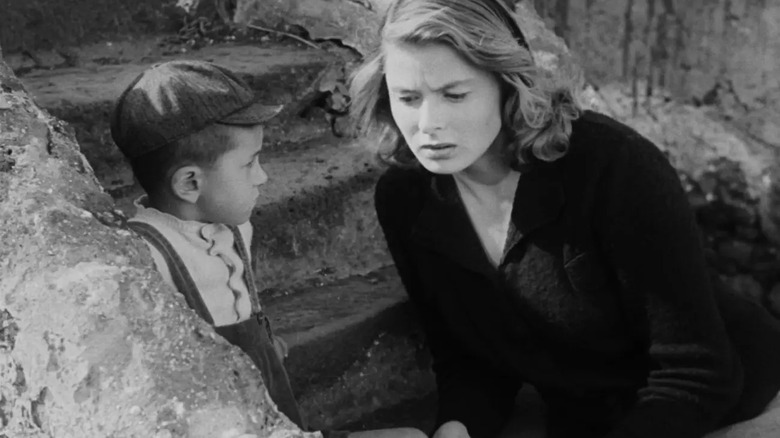The Controversy That Caused Ingrid Bergman To Leave Hollywood
The awards pedigree of Ingrid Bergman can never be understated. Nominated for seven acting Academy Awards, she won three for "Gaslight" in 1944, for "Anastasia" in 1956, and for "Murder on the Orient Express" in 1974. She also won two Emmys for her work in TV movies in 1960 and in 1982, and she earned a Tony for her performance in "Joan of Lorraine." Sadly, she never won a Grammy (Bergman is not an EGOT), but perhaps her myriad other acting awards from various critics' circles and international awards bodies make up for it.
Bergman's first credited role was in the 1935 Swedish drama "The Count of the Old Town," with her first Hollywood role coming in 1939 with "Intermezzo: A Love Story." She worked regularly all the way through her final film, Ingmar Bergman's "Autumn Sonata" in 1978. She got an Oscar nomination for that one, too. She was a regular installment throughout the Golden Age of Hollywood in the 1940s, and no article about Bergman can be written without mention of Michael Curtiz's "Casablanca," often called one of the best movies ever made. Bergman passed away in 1982 at the age of 67. She acted in her native Swedish, in German, in French, in Italian, and in English, all of which she could speak.
Bergman's personal life was, in at least one instance, just as dramatic as some of her films. In 1950, she starred in Roberto Rossellini's "Stromboli," leading to her having an affair with the director. This led to her divorce from her first husband and was one of the more notable Hollywood sex scandals of its decade.
Stromboli
Roberto Rossellini's "Stromboli" is a drama about a Lithuanian woman being held in an internment camp who, just to secure release, marries an Italian POW (Mario Vitale). She agrees to move to his home island of Stromboli, only to find that the conditions are harsh and difficult. The locals hate her, and she is made to feel uncomfortable at every step. "Stromboli" was Rossellini employing an Italian neorealist mode, a style of filmmaking that had become popular right at the end of World War II, and that Rossellini helped to codify with "Rome, Open City" in 1945.
The story goes — gleaned from notes on the Turner Classic Movies website — that Bergman wanted very much to work with Rossellini, who had made multiple notable Italian dramas up to that point. The two of them would form their own production company, Berit Films, to handle partial funding. And Bergman, one of the world's biggest movie stars, was able to secure a great deal of money from no one less than Howard Hughes, president of RKO Radio Pictures at the time. "Stromboli" was released on February 15, 1950 to a great deal of critical acclaim, but also a major push to have the film banned by various hand-wringing church groups and the like over Bergman's personal life. On February 2, 1950, Bergman gave birth to her and Roberto's son, Robin Rossellini, while she was still married to her first husband, Petter Lindström.
Uno scandalo molto italiano. Or perhaps: En väldigt svensk skandal.
The scandal that followed
According to The Guardian, Ingrid Bergman had already asked Petter Lindström for a divorce, as well as shared custody of their daughter, Pia. Lindström's refusal helped drag the scandal further into the public eye. He was, after all, the aggrieved party in all this. Left behind, with his 10-year-old daughter, by a free-spirited, gallivanting movie star? This tabloid-ready sex gossip was fodder for the public. After Robin's birth, Bergman was able to secure a divorce from Lindström in Mexico, where she also married Rossellini. She and Rossellini would have a pair of twins together in 1952, Isotta and Isabella (Isabella Rossellini became an acclaimed actress in her own right, and most recently appeared in "Marcel the Shell with Shoes On").
The "Stromboli" scandal, however, according to a 1950 article in the New York Times, not only attracted the attention of the public, but of blustering politicians in the United States Senate. A Colorado senator named Edwin C. Johnson (D-Colo.) brought up Bergman's affairs openly, blowing the situation far out of proportion. Johnson, formerly the governor of Colorado, declared that Bergman "had perpetrated an assault upon the institution of marriage." He continued:
"Mr. President, now that the stupid film about a pregnant woman and a volcano has exploited America with the usual finesse, to the mutual delight of RKO and the debased Rossellini, are we merely to yawn wearily, greatly relieved that this hideous thing is finished and then forget it? I hope not. A way must be found to protect the people in the future against that sort of gyp."
The Daily Beast wrote an article about the Johnson incident, declaring it to be one of the more notable examples of slut-shaming in political history.
Fallout
Edwin C. Johnson would propose new legislation inspired by Ingrid Bergman's affair(!), which would have allowed the government to ban movies based not merely on their content, but on the moral standing of those who made it. The legislation did not pass.
Johnson's words, however, was impetus enough for Bergman to flee from the United States for a spell. From 1950 to 1955, Bergman lived essentially in exile from America, making a series of notable films with Rossellini in Italy. During this time, she made "Europa 51," the anthology film "We, the Women," "Journey to Italy," "Fear," and "Joan of Arc at the Stake." She would also make "Elena and Her Men" with master director Jean Renoir. By 1956, it seems the heat was off, and Bergman returned to Hollywood to star in "Anastasia." As mentioned above, she won an Oscar for it. Bergman became increasingly nimble, and made mainstream Hollywood films alongside multiple international productions all the way through the 1970s.
Bergman and her daughter Pia wouldn't see each other again until 1957, the same year she and Rossellini were to divorce. Bergman would go on to marry her third husband, Swedish publicist Lars Schmidt, in 1958.
In 1972, according to the New York Times, Sen. Charles H. Percy (R-Ill.) issued a formal apology to Bergman for Johnson's hurtful remarks. Vindication at last.



